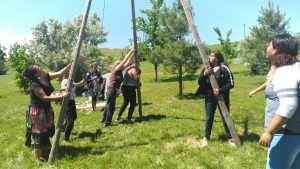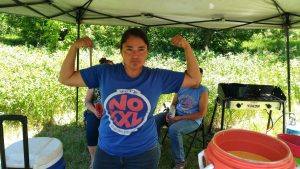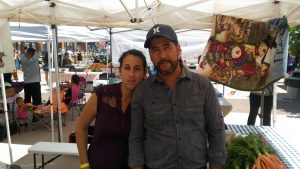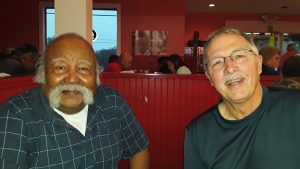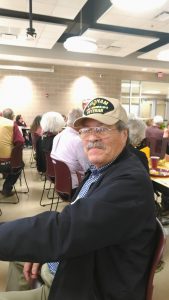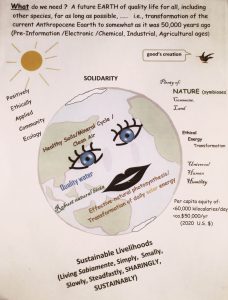(Dec 12th, 2011 Siempre Sustainable Network meeting, 6 pm-ca.9 pm, Mosaic Community Church, 1201 W. Court Street, Seguin 78155)
First of all, the idea for tonight, I think, is not to have an academic discussion—or any discussion—of whether Mexican-Americans were the first Texan environmentalists. And we’re not here, I think, to argue about if Native-Americans—and of course many Mexican-Americans have native American blood—were or are environmentalists. Moreover next month we won’t announce a program of: “African-Americans: the World’s First Environmentalists,” though it would be easy to make such a case.
What we would like for you to reflect on a bit is:
• the inherent environmentalist nature of Mexican-Americans,
• how it has perhaps been dampened in recent times,
• and how it might be comprehensively & profoundly reignited
This is what we hope will be examined by the panel and participating audience.
[Tonight we will have a glimpse of conservation & sustainability through the eyes & lives of a few Mexican-American citizens of south central Texas. (Sustainability implies social justice, humaneness, and ecological soundness, i.e., quality life for all, including other species, for as long as possible. … Please note that in this discussion, humans are an obvious component of “the environment”.)]
In the town where I (Paul Martin) spent my formative years (Devine, Texas) many Mexican-Americans worked the fields or in other aspects of agriculture–locally & in other areas of the U.S.; many lived separate from folk who were not “Children of the (Mexican) Revolution”; for a period of time there was a separate Mexican public school; and at St. Joseph’s Catholic Church, Mexican-Americans sat on the left side of the church, and folk of German, Czech, and British roots, etc. sat on the right … and there was a youth group for Mexican-Americans (CYO) & another for “Anglos” (Solidarity). I vividly remember an old Mexican-American man who lived in a very small mostly cardboard house with a wood stove near the feed mill where my Dad worked. At school, Mexican-Americans were told they couldn’t speak Spanish. …
However, these situations changed rapidly in the 1950s, 60s, and 70s, the years in which I was still mostly living in Devine.
One of the various vehicles of change in socio-political/economic (ecological) status and in the behavior & attitudes of Mexican-Americans, was military service. Author Chris Hedges has written that “War is the Force that Gives Us Meaning!” Many of my Mexican-American friends/acquaintances through the years:
• spent time in military service … many in Vietnam—and older ones in the Korean War or World War II; younger students in Iraq & Afghanistan … ;
• many worked at Kelly Air Force base, and
• many belong/belonged to various veterans organizations.
These military experiences had to have greatly affected Mexican-Americans and their perceived role in community, their attitudes toward citizens of other countries, and their attitudes about the environment around them. (Of course …
• the capitalistic economic-boom years after World War II,
• civil rights movement including what went on in Crystal City & other “Mexican-American communities”, and
• community-college & other higher-education-system opportunities
largely affected this change also.)
Questions for the panel:
When my family moved to Devine in 1951, our second house was about a mile out of city limits, across from the Peña’s home and surrounded by brushy pasture. As a young kid of about 6-7 years of age, the young Peña boys close to my age, Esteban & Alejandro, taught me about native plants in the pasture, and uses of these various plants. (Moreover, their Dad gave us gallons of horse-mint honey from his bee colonies.)
This first question is for anyone on the panel: Did you have such knowledge of native south Texas plants in your family? Tell me about the importance of such to your family, then & now.
Robert, tell me a bit about your interactions with Nature, labor intensive (sustainable?) agriculture, and the outdoors? How important was/is getting out into the outdoors and participating in outdoor activities to you?
Mary Louise, would you say Mexican-Americans are generally considered to be active in the so-called “environmental or sustainability movements?” Why or why not?
Paul Castillo, could you comment of importance of Mexican-Americans becoming more involved in “conservation & sustainability” activities? Why or why not?
Cris: How might we get all U.S. citizens/all folk more involved in conservation as well as development toward quality life for all?
Stella: How might we realize more vegetable gardens in Seguin which are truly sustainable community gardens, e.g., with more active participation by a cross-section of the community, including Mexican-Americans?
Anyone on the panel: Please add anything else which might contribute to an understanding of Mexican-American mindsets re “conservation and development of sustainable community”, e.g., importance of family, heritage, traditions, sense of community, sense of place or any other aspect.
pbm
[ 7 Ss / VV->^^ ]
